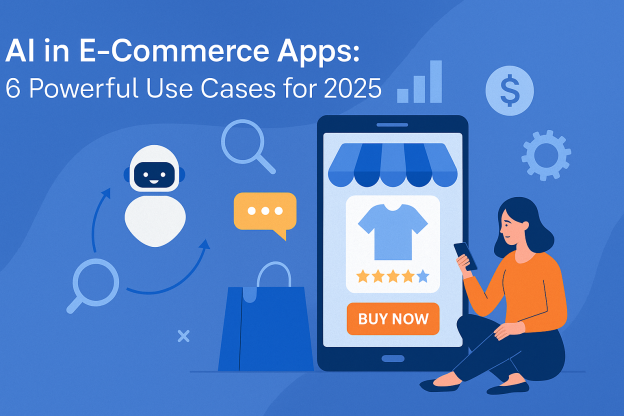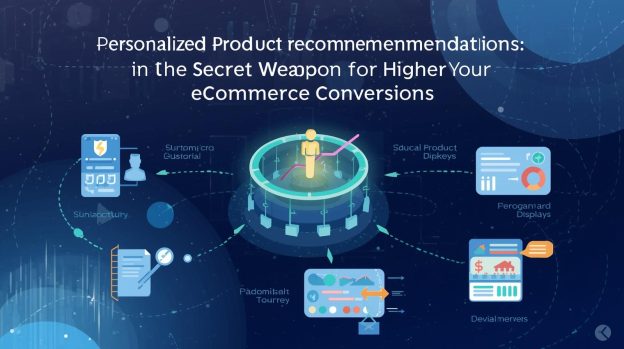How AI Is Powering E-Commerce Success: Real-World Use Cases That Deliver Results

Advanced AI-powered tools are revolutionising how customers shop, and how retailers operate. From forecasting sales and understanding changing preferences to improving customer service, AI is enhancing nearly every part of the e-commerce experience. AI applications in e-commerce revolutionise the overall shopping experience of customers. You can integrate AI in various touchpoints across the customer journey. Companies leverage artificial intelligence due to its capability of analysing a large amount of data. AI is getting more accurate by the day. It is capable of providing data-driven forecasts and insights that influence key decision-making. E-commerce businesses are driven to make more data-driven and informed decisions.
The implementation of AI solutions in e-commerce benefits retailers and business owners by driving more sales and improving the customer experience. Among many applications of AI in e-commerce, personalisation and seamless shopping experience directly impact customer retention. Let’s look at various use cases of AI in e-commerce in this article –
Proven AI Use Cases in E-Commerce
Since AI is transforming the e-commerce landscape, how do you know which AI features will be good for your business? Let’s look at some of the most implemented AI tools and technologies in e-commerce –
Personalisation
Do you ever see the “You Might also like” section in your e-commerce app? It includes AI’s personalised recommendations for you. An AI personalisation recommendation system works by considering the customer’s purchase history. It analyses cart items, customer behaviour with the app pages, time spent on viewing the products and customers’ interactions on the app. AI’s personalised recommendations system uses machine learning and predictive analytics, based on which it derives smart recommendations.
Retailers can evaluate the top products on the e-commerce platforms and identify the common purchase patterns. AI uses a collaborative filtering algorithm to recommend products to customers. AI changes the product recommendations in real-time based on changing customer patterns. Businesses can launch an email series including personalised recommendations for customers. Companies like Amazon, Myntra and Nykaa extensively use AI recommendation systems to drive engagement from customers.
AI-Powered Chatbots
AI-powered chatbots provide a seamless experience to customers. They offer extensive 24.7 support to customers that enhances their shopping experience. Chatbots use Natural Language Processing to understand customer queries and reply with relevant and accurate responses. AI Chatbots can offer immediate support, human-like conversations, recommend products, answer FAQs and even perform executive tasks like processing transactions.
As opposed to traditional chatbots, AI chatbots are intelligent machines that remember the interactions from the past. Customers can take their conversation forward without backtracking the conversation. AI chatbots can maintain the context between interactions. Through this, they enable a more convenient and efficient service for customers. Customers can carry out different tasks with the assistance of AI chatbots. It elevates customer loyalty and experience.
Smart Search Capability
AI in e-commerce allows for smart searching. It includes text search, visual search and context-based search. AI search capability makes shopping easier and faster for customers. Retailers can enhance their product discovery process by integrating NLP, AI-assisted visual search and contextual search on their website.
The website’s search engine will be able to understand the intent behind the user’s query in any language. Even if you leave typos in the spelling or use a mix of different languages in the search term, the search engine will deliver the most relevant results. In addition, customers can search for products by uploading an image that allows visual search. There is also the option of context-based search. In this, the AI algorithms can look for seasonality, day of the week or trending products to provide more relevant recommendations.
Predictive Inventory Management
Artificial intelligence in e-commerce platforms helps in predictive inventory management. It can analyse past sales data based on which it forecasts future demand. Demand planning tools can help e-commerce retailers reduce inventory by 20 to 30% without affecting service levels.
Through this, they can free significant working capital and utilise it for business growth. Retailers can use AI to automate inventory, which automatically raises stocks at the time of sales. Another benefit of AI-based predictive inventory management is store-to-store transfer suggestions, smart shipping solutions, dynamic re-order triggers and return forecasting.
AI Auto-generated Content
Retailers can use generative AI for creating content such as writing product descriptions, creating dynamic website content, creating marketing content and providing personalised product recommendations. Gen AI content for e-commerce websites drives greater engagement and sales. Gen AI tools evaluate customer profiles and the current behaviour based on which they create tailored content. Gen AI creates dynamic content depending on specific audience preferences.
AI-powered Dynamic Pricing
Artificial intelligence in e-commerce can help in dynamic pricing optimisation. Retailers can set dynamic pricing of their products through which they can optimise the prices in a real-time environment. It increases their revenue by up to 20%.
Retailers can implement the dynamic pricing engine based on AI, which integrates well with the e-commerce platform. They will need to define some constraints and pricing rules that include maximum discount percentages, minimum profit margins, etc. The machine learning algorithms can help in evaluating historical sales data, market trends, and competitive prices for optimising the pricing strategy. Retailers can create a custom pricing algorithm considering factors like competitor prices, demand forecast and stock levels.
The pricing optimisation agent is an effective choice for retailers in the e-commerce industry because it is quick in evaluating demand patterns, computing competitor pricing and conversion performance. The algorithm reacts quickly to the changing market patterns without requiring any manual effort. Along with this, it also reduces the need for constant pricing oversight.
To Sum Up
AI in e-commerce not only helps customers with an improved experience, but it also assists retailers in improving operational feasibility. AI helps in effective supply chain optimisation, fake review detection, fraud detection, and prevention. Online retailers can leverage real-time data for scaling personalised experiences and improving overall e-commerce operations.
Through this, they will be able to enhance customer engagement, improve customer loyalty and overall sales. Artificial intelligence in e-commerce facilitates enhanced decision-making, fosters better customer experience and improves customer retention and loyalty. It also leads to a higher conversion rate and improved marketing campaigns. If you are looking for feasible e-commerce solutions in the form of websites, mobile applications and web applications, get a quote from VerveLogic, a leading mobile app development company Atlanta.



